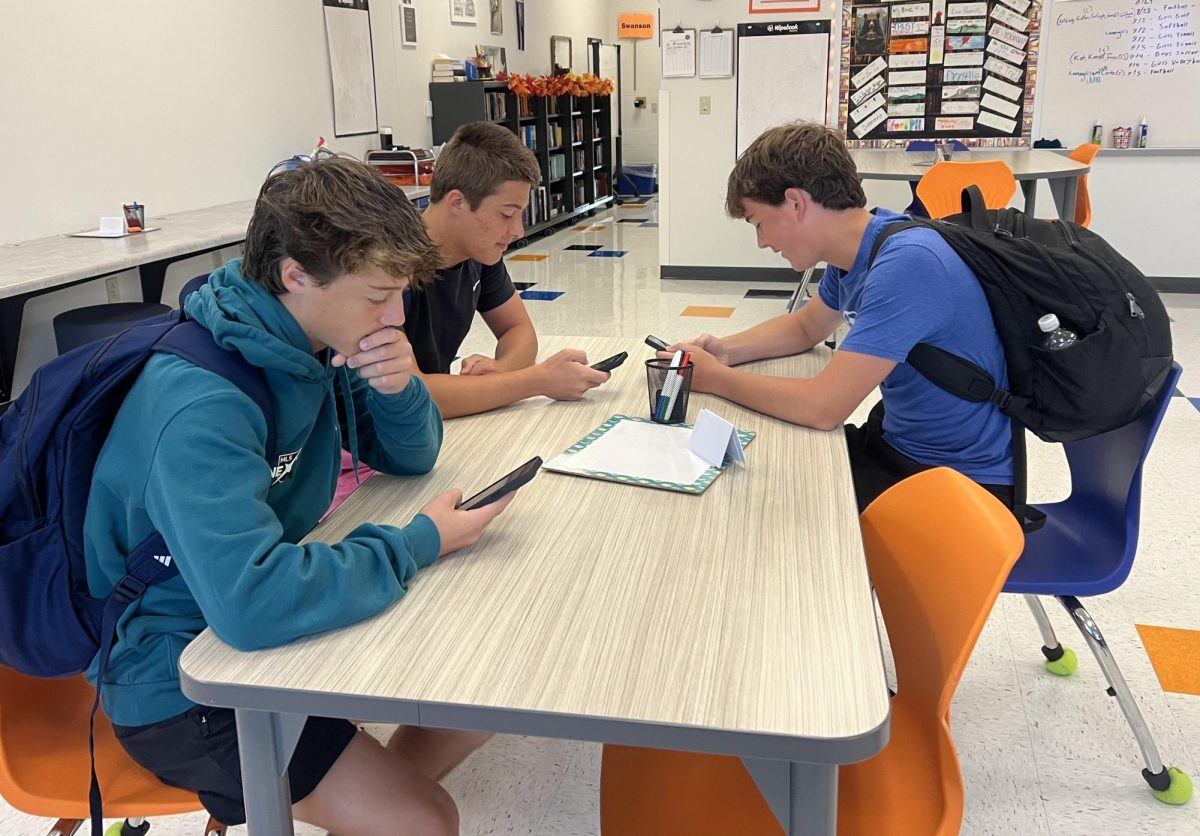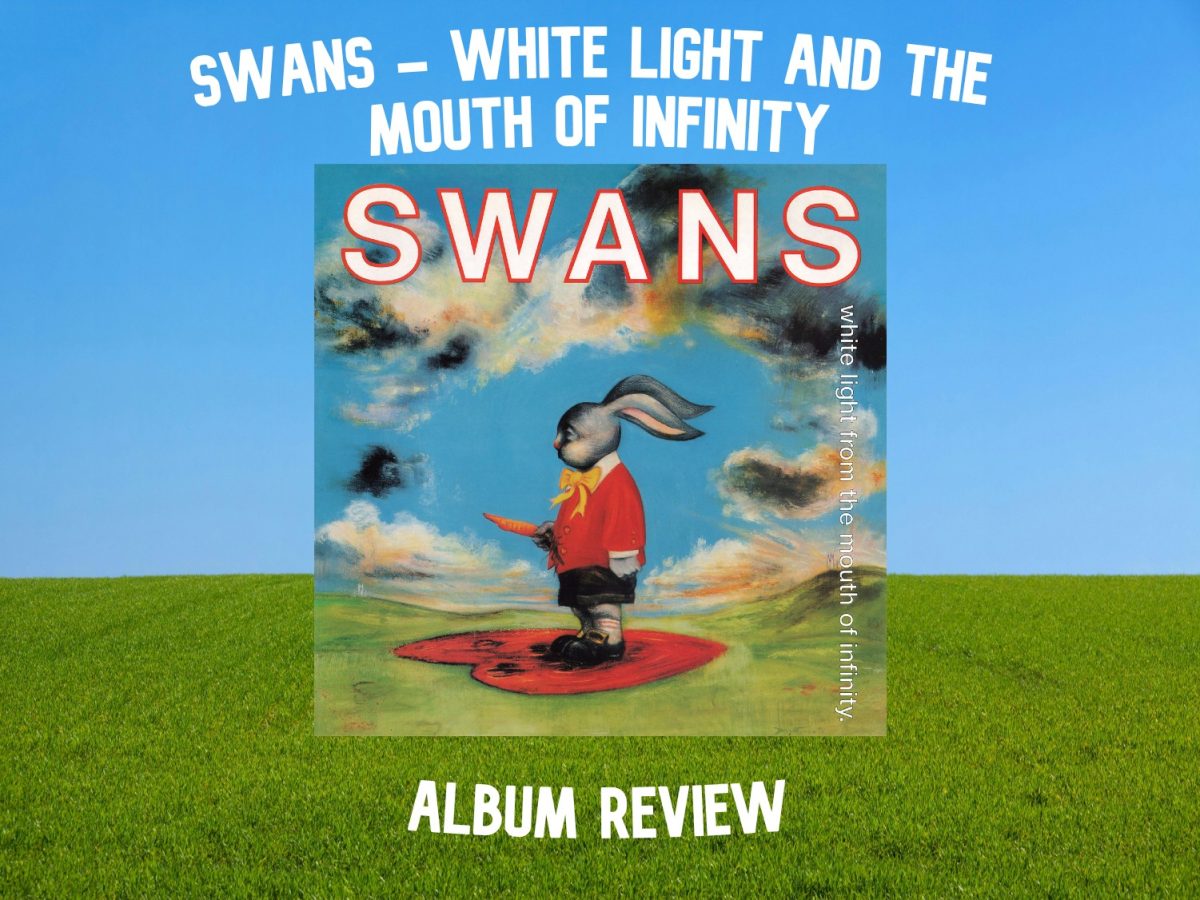Swans’ immeasurably dense discography has made many incredible changes over the years. Starting out with brutal, ugly, and unforgiving noise rock, they would eventually blossom into experimental and gothic rock, along with neofolk.
Of course, later down the line the band would create some of their most popular and acclaimed works, with “The Great Annihilator” and “Soundtracks For the Blind” becoming classics and defining projects from them pre-breakup. And while those two albums see Swans mastering their different sounds over the years, it wasn’t where they had originally found their footing. That to me started around the time of their seventh album, “White Light From the Mouth of Infinity.”
After their sixth album, “The Burning World,” a neofolk album notoriously hated by lead singer Michael Gira and what is considered to be one of their worst albums by fans, “White Light” stepped back into their gothic rock sound with neofolk still incorporated. The album sounds much less menacing than projects like “Children of God,” but in turn sounds more fleshed out and bright than earlier works.
“Normally when I listen to Swans, what I expect are very long, drowned out sequences with a lot of building on top of each other,” student Jackson Moulton (’26) said. “White Light From the Mouth of Infinity comes in and hits you immediately.”
“Better Than You” and “Power and Sacrifice” as opening tracks immediately show the band dynamically switching between their harsher moments of rock between their more folk-centered moments, with Gira’s calmer lyrical delivery helping guide the instrumentals through.
I love how “Better Than You” is simultaneously massive and pounding, yet it contains moments of calm that still feels quite eerie. “You Know Nothing” has a similar formula to this, with its sections of distorted guitars and repeating drum hits creating one of the most menacing moments on the album. “Will We Survive” also has a great ending with the band playing one chord progressively louder as the drums get more frantic and chaotic.
While some tracks do tend to maintain a more aggressive style, “White Light” also contains moments of delicacy. “Song For Dead Time” is sung by member Jarboe Devereaux, and has a very dark atmosphere, with the band stripping back from the more rock oriented purposes. It is a welcome break after the triumphant first three tracks before bringing that back with “Will We Survive.”
“Love Will Save You” easily has my favorite instrumental moment in the tracklist, though, specifically with its ending. The band backing the beautiful looping melody of the piano while slowly building their sound is one of the most beautiful moments on the album, within one of the most beautiful songs on it.
The lyrics by Gira and Jarboe can feel almost primal and wonderfully simple at certain points, like on songs such as “Better Than You.”
“I think this album is still as primal as some Swans albums, but instead of being primal with the delivery, it is more primal with the thought process of the lyrics,” Moulton said. “The whole crux of [“Better Than You’s”] chorus is ‘I’m so glad I’m better than you,’ it does not get more on the nose than that. There is no poetic meaning, but just primal urge, and feeling, and want.”
However, at other points the lyrics are very introspective and contain certain dark undertones that put the message of this entire album together. “Failure” and “Blind” both have a similar lyrical meaning from different angles.
“Failure” sees Gira falling into a miserable cycle of despair, despite trying his best to break free. He knows he will never leave this state, reflecting on how one becomes a failure, what he would do to release himself from that state, even bringing up his parents’ relationship, and specifically how his father died as a “failure.” He and his wife were once rich people before becoming completely broke, and while they managed to get some money back, Robert Gira died a poor man in pain.
“Blind” has a similar story to one of Gira’s father, one where the protagonist begins with much ambition, before slowly losing it throughout the song’s run time. While in the song, Gira calls it being “blind,” it is also easy to make the connection that this protagonist is what Gira would call a “failure.”
The album also discusses lyrical topics of love, like on the track “Miracle of Love,” where Gira simply lists what his partner does that makes her so special to him, before blasting into one of the loudest and most radiant climaxes of the album.
“Love Will Save You” takes the topic of love and views it from an angle of Christianity, and how the idea of love is represented by Jesus’ sacrifice on the cross. Gira lists how this form of pure love can only be helpful to a person, and alluding to how it will never leave despite one’s choices, faults, and decisions. He even mentions the story of Judas, the man who had betrayed Jesus and caused him to be executed, and ultimately took his own life out of guilt, and how he didn’t know that Jesus’ love would have been enough to be forgiven. Each verse of the song ends with Gira concluding that love will not save him, which may be a reference to his self hatred in songs such a as “Blind” and “Failure.”
“The Most Unfortunate Lie” is also a song with a biblical angle to it, this time referencing the Old Testament. In the song, Gira seems to be representing the ignorance towards things such as sin and an imperfect world being taken away by the ambitions of humankind, referencing Adam and Eve eating the apple from the snake, and creating a world full of sin.
The lyrical value of the album can feel so vast, which is what makes it so interesting to dig into after the first listen.
Some songs can feel a bit forgettable, like “Song of the Sun” and “When She Breathes.” “Song of the Sun,” while having a great instrumental, just simply does not feel as triumphant as some of the other songs on the tracklist, and while “When She Breathes” does have a darker and more mysterious atmosphere, Jarboe’s lyrics, while interesting, feel too vague to really be able to dive into.
Despite those tracks though, this album is mostly fantastic, and a great comeback from Swans after two of their most shifty projects yet.
“This album feels like being set on fire, it is the most punishing, radiant Swans album I’ve ever listened to,” Moulton said. “It kind of reminds me of later albums like Oxygen, which comes out swinging, or the second part of She Loves Us comes out strong and heavy.”
The production takes their gothic rock and neofolk sounds and combines them seamlessly, while Gira and Jarboe create some of their most introspective and serious lyrical content yet. “White Light From The Mouth of the Infinity” proved that the band was worth seeing through to their evolution, and to see where they would go next. I would give this album an eight out of 10.

























